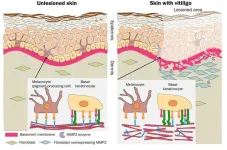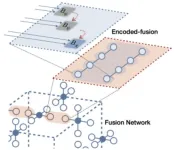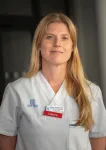(Press-News.org) New research suggests that a family member’s cancer diagnosis may increase first-degree relatives’ and spouses’ risks of developing psychological and cardiovascular illnesses. The findings are published by Wiley online in CANCER, a peer-reviewed journal of the American Cancer Society.
Having a family member diagnosed with cancer can be a stressful and traumatic experience for the entire family. Because stress influences not only mental health but also cardiovascular health, investigators explored whether a cancer diagnosis contributes to negative psychological and cardiovascular outcomes in family members.
Using data from the Utah Population Database, the researchers identified 77,938 first-degree relatives and spouses of 49,284 individuals diagnosed with genitourinary cancer between 1990 and 2015, and they compared them with 81,022 relatives and spouses of 246,775 individuals not diagnosed with cancer.
The team found that 7.1% of relatives and spouses were diagnosed with a psychological illness within 5 years of a family member’s cancer diagnosis, and 7.6% were diagnosed with a cardiovascular illness. Compared with controls, they had 10%, 5%, and 4% higher risks of developing a psychological condition at 1, 3, and 5 years after a family member’s cancer diagnosis. They also had 28%, 16%, and 14% higher risks of developing cardiovascular disease at 1, 3, and 5 years.
Parents of children with cancer experienced the highest risks of developing negative health outcomes—a nearly 4-times increased risk at 1-year compared with other relatives. Also, a diagnosis of kidney or bladder cancer appeared to be the most stressful among genitourinary cancer types, while testis cancer was the least.
“A diagnosis of cancer is a life-changing event for patients and their families. With our group’s unique access to the Utah Population Database, we were able to create multi-generational networks highlighting the impact of a cancer diagnosis on families,” said lead author Mouneeb Choudry, MD, of the Mayo Clinic, in Phoenix, Arizona. “As health care professionals, we should take a multidisciplinary approach to addressing the stress of a cancer diagnosis by helping mitigate financial toxicity, treatment burden, and emotional impact on both the patient and their family.”
Additional information
NOTE: The information contained in this release is protected by copyright. Please include journal attribution in all coverage. A free abstract of this article will be available via the CANCER Newsroom upon online publication. For more information or to obtain a PDF of any study, please contact: Sara Henning-Stout, newsroom@wiley.com
Full Citation:
“Genitourinary Cancer and Family: The Reverberating Psychological and Cardiovascular Effects of a Genitourinary Cancer Diagnosis on First-Degree Relatives and Spouses.” Mouneeb M. Choudry, Nicole Murray, Kassandra Dindinger-Hill, Jacob Ambrose, Trevor Hunt, Joshua Horns, Christopher Martin, Benjamin Haaland, William Lowrance, Heidi A. Hanson, Richard Matern, Patrick C. Cartwright, and Brock O’Neil. CANCER; Published Online: September 9, 2024 (DOI: 10.1002/cncr.35486)
URL Upon Publication: http://doi.wiley.com/10.1002/cncr.35486
Author Contact: Choudry.Mouneeb@mayo.edu
About the Journal
CANCER is a peer-reviewed publication of the American Cancer Society integrating scientific information from worldwide sources for all oncologic specialties. The objective of CANCER is to provide an interdisciplinary forum for the exchange of information among oncologic disciplines concerned with the etiology, course, and treatment of human cancer. CANCER is published on behalf of the American Cancer Society by Wiley and can be accessed online. Follow CANCER on X @JournalCancer and Instagram @ACSJournalCancer, and stay up to date with the American Cancer Society Journals on LinkedIn.
About Wiley
Wiley is a knowledge company and a global leader in research, publishing, and knowledge solutions. Dedicated to the creation and application of knowledge, Wiley serves the world’s researchers, learners, innovators, and leaders, helping them achieve their goals and solve the world's most important challenges. For more than two centuries, Wiley has been delivering on its timeless mission to unlock human potential. Visit us at Wiley.com. Follow us on Facebook, X, LinkedIn and Instagram.
END
Can coping with a cancer diagnosis contribute to psychological and cardiovascular problems in family members?
Study’s findings reveal increased risks, indicating the need for interventions to reduce stress for patients and their relatives.
2024-09-09
ELSE PRESS RELEASES FROM THIS DATE:
Loss of skin’s pigment-producing cells could be related to basement membrane disruption
2024-09-09
Skin pigmentation disorders affect people across the world. One of them, vitiligo, is said to have a worldwide incidence of 1-2%. What causes the loss of pigmentation in vitiligo has long been unclear, but an Osaka Metropolitan University-led team has uncovered clues to the mechanism behind the disorder.
In findings published in The Journal of Pathology, Graduate School of Medicine Specially Appointed Associate Professor Lingli Yang, the corresponding author, and researchers including Specially Appointed Professor Ichiro ...
Developed proprietary quantum error correction technology beyond the world's leading quantum computing companies
2024-09-09
Solving the problem of error is essential for the practical application of quantum computing technologies that surpass the performance of digital computers. Information input into a qubit, the smallest unit of quantum computation, is quickly lost and error-prone. No matter how much we mitigate errors and improve the accuracy of qubit control, as the system size and computation scale increase, errors accumulate and algorithms become impossible to perform. Quantum error correction is a way to solve this problem. As the race for global supremacy in quantum technology intensifies, most major companies and research groups leading the development of quantum ...
AI will surpass human brains once we crack the ‘neural code’
2024-09-09
Humans will build Artificial Intelligence (AI) which surpasses our own capabilities once we crack the ‘neural code’, says an AI technology analyst.
Eitan Michael Azoff, a specialist in AI analysis, argues that humans are set to engineer superior intelligence with greater capacity and speed than our own brains.
What will unlock this leap in capability is understanding the ‘neural code’, he explains. That’s how the human brain encodes sensory information, and how it ...
RSV vaccination in older adults with health conditions is cost-effective
2024-09-09
Targeting vaccination programs for respiratory syncytial virus (RSV) to older adults with underlying health conditions is a cost-effective way to reduce disease, according to a new modelling study https://www.cmaj.ca/lookup/doi/10.1503/cmaj.240452 in CMAJ (Canadian Medical Association Journal).
RSV infections cause major illness, especially in infants and older adults, and rates of infection increase with age. There are now vaccines available to prevent disease caused by RSV in adults, and vaccination campaigns may reduce the incidence in older adults and associated ...
Melanoma incidence and mortality trends in Sweden
2024-09-09
About The Study: The findings of this cohort study showed a significant recent downward trend in both melanoma incidence and melanoma mortality in the age group 30 to 49 years in Sweden. The reasons for these declines are unclear but may include UV protection, public health campaigns, changing population demographics, and the introduction of effective melanoma treatment. None of these possibilities were evaluated; further study is needed.
Corresponding Author: To contact the corresponding author, Hildur Helgadottir, MD, PhD, email hildur.helgadottir@sll.se.
To access the embargoed study: Visit our For The Media ...
Breaking the trend: Skin cancer incidence in young adults declines
2024-09-09
The risk of skin cancer, malignant melanoma, now appears to be decreasing in Sweden - at least in those under 50, according to a new study.
“We can see a trend break in young adults around 2015 where the incidence curves are falling,” says first author Hildur Helgadottir, senior consultant and associate professor of oncology at the Department of Oncology-Pathology, Karolinska Institutet.
She and her research colleagues have analyzed data from the Swedish Melanoma Registry and followed melanoma incidence and mortality for different age segments over time. This means that they have compared individuals in a certain age range at one ...
ChatGPT outperformed trainee doctors in assessing complex respiratory illness in children
2024-09-09
The chatbot ChatGPT performed better than trainee doctors in assessing complex cases of respiratory disease in areas such as cystic fibrosis, asthma and chest infections in a study presented at the European Respiratory Society (ERS) Congress in Vienna, Austria [1].
The study also showed that Google’s chatbot Bard performed better than trainees in some aspects and Microsoft’s Bing chatbot performed as well as trainees.
The research suggests that these large language models (LLMs) could be used to support trainee doctors, nurses and general practitioners to triage patients more quickly and ease pressure on health services.
The ...
Night owls are more likely to develop type 2 diabetes – and it’s not just because of an unhealthy lifestyle, Dutch study finds
2024-09-09
Night owls have a higher BMI, larger waists, more hidden body fat and are almost 50% more likely to develop type 2 diabetes (T2D) than those who go to bed earlier, new research to be presented at the Annual Meeting of the European Association for the Study of Diabetes (EASD) in Madrid, Spain (9-13 September), has found.
Lead researcher Dr Jeroen van der Velde, of Leiden University Medical Centre, Leiden, Netherlands, says: “Previous studies have indicated that a late chronotype – preferring to go to bed late and wake up later – is associated with an unhealthy lifestyle. Late chronotypes are ...
Air travel may affect insulin pump delivery in people with type 1 diabetes
2024-09-09
Altitude changes during commercial flights may affect the blood glucose levels of people with type 1 diabetes who are treated with insulin pump therapy, according to new research to be presented at this year’s Annual Meeting of The European Association for the Study of Diabetes (EASD), Madrid (9-13 Sept).
“We investigated the effect atmospheric pressure changes during flight can have on insulin pumps following concerns that glucose levels may drop below the normal ranges during or immediately after flights,” explained lead author Dr Ka Siu Fan from the Royal Surry County Hospital and University ...
Fruit and oats raise risk of type 1 diabetes but berries provide protection, research suggests
2024-09-09
New research being presented at the annual meeting of the European Association for the Study of Diabetes (EASD) in Madrid, Spain (9-13 September), shows that eating fruit, oats and rye in childhood is associated with a higher risk of developing type 1 diabetes (T1D). Eating berries, however, is linked to lower odds of developing the condition.
T1D is an autoimmune condition in which the immune system attacks and destroys the insulin-producing islet cells in the pancreas. This prevents the body from producing enough of the hormone insulin to properly regulate blood sugar levels.
What triggers the immune system’s attack is unknown but is thought to involve a combination ...
LAST 30 PRESS RELEASES:
Scientists develop new gut health measure that tracks disease
Rice gene discovery could cut fertiliser use while protecting yields
Jumping ‘DNA parasites’ linked to early stages of tumour formation
Ultra-sensitive CAR T cells provide potential strategy to treat solid tumors
Early Neanderthal-Human interbreeding was strongly sex biased
North American bird declines are widespread and accelerating in agricultural hotspots
Researchers recommend strategies for improved genetic privacy legislation
How birds achieve sweet success
More sensitive cell therapy may be a HIT against solid cancers
Scientists map how aging reshapes cells across the entire mammalian body
Hotspots of accelerated bird decline linked to agricultural activity
How ancient attraction shaped the human genome
NJIT faculty named Senior Members of the National Academy of Inventors
App aids substance use recovery in vulnerable populations
College students nationwide received lifesaving education on sudden cardiac death
Oak Ridge National Laboratory launches the Next-Generation Data Centers Institute
Improved short-term sea level change predictions with better AI training
UAlbany researchers develop new laser technique to test mRNA-based therapeutics
New water-treatment system removes nitrogen, phosphorus from farm tile drainage
Major Canadian study finds strong link between cannabis, anxiety and depression
New discovery of younger Ediacaran biota
Lymphovenous bypass: Potential surgical treatment for Alzheimer's disease?
When safety starts with a text message
CSIC develops an antibody that protects immune system cells in vitro from a dangerous hospital-acquired bacterium
New study challenges assumptions behind Africa’s Green Revolution efforts and calls for farmer-centered development models
Immune cells link lactation to long-lasting health
Evolution: Ancient mosquitoes developed a taste for early hominins
Pickleball players’ reported use of protective eyewear
Changes in organ donation after circulatory death in the US
Fertility preservation in people with cancer
[Press-News.org] Can coping with a cancer diagnosis contribute to psychological and cardiovascular problems in family members?Study’s findings reveal increased risks, indicating the need for interventions to reduce stress for patients and their relatives.


